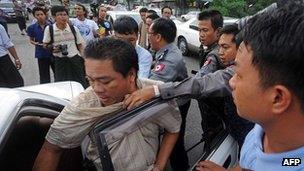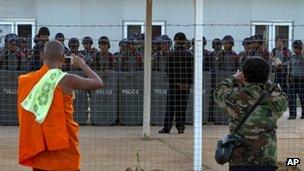Burma courts charge protesters over copper mine protest
- Published

Protest leader Aung Soe was detained on Sunday
Eight people have appeared in courts in the Burmese city of Rangoon in connection with recent protests against a giant copper mine, activists say.
Moe Thwe, a protest leader, and seven others were charged with incitement against the state and demonstrating illegally. They deny the charges.
All were refused bail. Another two activists are wanted by police.
The case is seen as a test of how the new government handles growing protests over projects begun under the military.
Farmers around the country say they have been evicted in land grabs to make way for industry. The authorities deny the allegations.
Dozens of people were injured when police broke up protests against the vast Chinese-backed mine at Monywa in the north-west last Thursday.
Kyi Zin Tha of pro-democracy group Generation Wave told BBC Burmese those produced in court on Monday had not been inciting against the state.
He said they had been responding to public anger at the use of force against protesters, including many monks.
About 70 monks were taken to hospital with burns after last week's crackdown on protest camps near Monywa, BBC Burmese says.

Monks had joined the protest against the copper mine's expansion
The farmers started their protest in June, saying they had been forced to accept a deal two years ago under which they gave up their land in return for new housing and financial compensation.
The mine's billion-dollar expansion project covers several thousand hectares of land in Burma's Sagaing region.
It is owned by the military and Chinese arms manufacturer Norinco.
The company has said that the deal was voluntary, and that only a small minority of farmers rejected it. The government says it is still committed to a full inquiry into the farmers' complaint.
The farmers have little experience of political mobilisation, and have been encouraged by the involvement of political activists and the support of Buddhist monks.
The BBC's Jonathan Head, who recently visited the Monywa mine, says it has now become a national cause, encompassing issues that will be central to Burma's post-military development - land rights, environmental protection, freedom to protest, and balancing the interests of big investors with those of ordinary Burmese citizens.
Of these, land may turn out to be the most explosive issue, and the hardest for the new government to solve, he says.